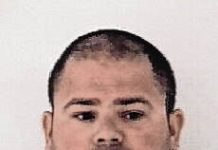
Columbus Regional Health is planning to start turning its current hospital security unit into an in-house police force this year in response to what officials said has been an increase in “quickly escalating or high-risk, sometimes violent situations” at the hospital in recent years.
The transition, which includes phasing out the use of off-duty Columbus police officers and Bartholomew County sheriff’s deputies as hospital security, is expected to be a multi-year effort, said CRH spokeswoman Kelsey DeClue.
By the end of 2023, CRH tentatively plans to have eight sworn officers and five non-sworn officers in the hospital’s police department, which will be led by Tony Pope, director of protective services at CRH and a veteran law enforcement officer with 27 years of experience, who will serve as chief.
Currently, CRH employs 12 people in its protective services department. Additionally, five Bartholomew County sheriff’s deputies and 12 Columbus Police Department officers work off-duty security at the hospital.
The hospital police officers will work to keep patients, staff and visitors safe and enforce and communicate policies and procedures. The officers will have the same powers as city police officers — including carrying guns and making arrests — but will only have jurisdiction on CRH property.
None of CRH’s current protective service officers have the power to make arrests or carry weapons, DeClue said.
‘Seeing more
volatile situations’
CRH officials said the move is not related to recent cases of ghost employment by two Columbus police officers who pleaded guilty to working a second job providing security at the hospital while clocked in as city officers.
“We’re seeing more volatile situations in the healthcare setting and the inpatient setting, especially those against health care personnel,” DeClue said. “It’s not always malicious, but sometimes it is. The level of response capability that’s needed to bring those situations down to a manageable, safe level for everyone involved has definitely increased as well.”
The formation of the new police force, announced on Dec. 21 by the Indiana Law Enforcement Academy, comes as hospitals across the country report increases in violence and other security issues, prompting some hospitals to form their own police departments.
Nearly 7 in 10 hospital physicians say violence is increasing in emergency departments, including 47% who reported being physically assaulted at work and 71% who said they witnessed others being assaulted, according to a recent national survey by the American College of Emergency Physicians.
Health care workers have reported being bitten, kicked, punched and pushed while on the job, according to the Joint Commission, a not-for-profit that accredits health care organizations.
Often, volatile situations may involve individuals in an altered state of mind due to substances or an underlying medical condition, according the Joint Commission.
Half of emergency physicians reported that about 50% of all assaults are committed by people who are seeking drugs or alcohol or are under the influence of substances, the survey found.
CRH officials declined to provide details on what kinds of incidents have been occurring locally, citing patient privacy laws, but hope the police force will reduce the need to call the Columbus Police Department and Bartholomew County Sheriff’s Office for outside help.
Nevertheless, the local hospital system joins a growing list of hospitals in Indiana that have formed their own police departments, becoming the 14th hospital police force in state since 2013, when state lawmakers allowed hospitals to establish in-house police departments, said Capt. David Younce, spokesman for the Indiana Law Enforcement Academy.
Under Indiana code, the governing board of the hospital can appoint officers, prescribe their duties and direct their conduct, but their jurisdiction is limited only to property owned, leased or occupied by the hospital.
Currently, there are about 278 hospital police officers in Indiana, Younce said
“The list (of hospitals) keeps getting bigger,” Younce said.
Training
CRH’s police force will include “a variety of staff” but will be divided into two basic tiers, including sworn officers — who will respond to more high-risk or violent situations — and non-sworn officers — who will handle lower-risk situations.
All CRH police officers will undergo training at the Indiana Law Enforcement Academy and receive additional training curriculum by the International Association for Healthcare Security and Safety, DeClue said.
The International Association for Healthcare Security and Safety is a professional association that offers training and certification programs on how to maintain security and safety at healthcare facilities.
The association designated CRH as a “program of distinction” in 2019.
Hospital police officers must undergo a 10-week training at the academy, though the training is “not quite as intensive” as the 15-week training that most city police officers and sheriff’s deputies undergo at the academy, Younce said.
Part of the training is done on-site at the academy, while the other part is completed at home. The academy started a new training class on Monday, but none of the 36 people enrolled are CRH police officers.
Hospital police officers are given the same curriculum as town marshals, school police officers and some Department of Corrections officers.
“If it’s transporting a patient that is a little agitated, that needs some support but probably doesn’t need a full police officer,” DeClue said. “If it’s a violent situation that happens in our emergency department where weapons are involved and people’s lives are at stake, we’re going to need a sworn police officer with the full bevy of training to respond to that as quickly as possible.”
Oversight
The police force will be overseen by the CRH Board of Trustees, the hospital’s governing body, and subject to all state statutes like any city police department or county sheriff’s department in Indiana, DeClue said.
CRH’s Board of Trustees includes Sherry Stark, David Doup, Donald Trapp, Don Michael, Dr. Frederick Shedd and Zack Ellison, according to CRH’s website.
CRH does not plan to immediately seek accreditation for the police force, but may consider accreditation as the department ramps up.
Bartholomew County Sheriff Matt Myers has welcomed the announcement of the hospital’s police force, describing the creation of the new police department as “100% the right thing to do.”
“(Hospital police) will have arrest powers like every law enforcement department,” Myers said. “But the hospital is both a business and a service to the community. It takes a special type of person to deal with some of the people who come into a hospital”
Initially, the public won’t see “a noticeable difference” with hospital security at CRH, but that will likely change as the year progresses, DeClue said.
“The best guess is that throughout 2021 we’ll be solidifying everything that we need with the pieces of this so that by the end of this coming year the public will see a noticeable difference in our current protective services department as it transitions to a police department,” DeClue said.




